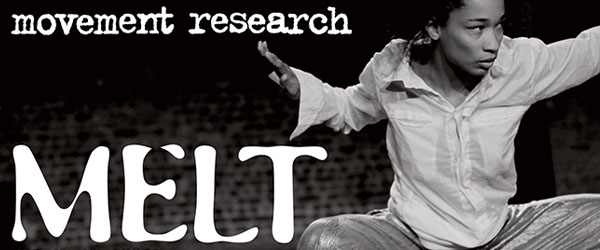Critical Correspondence
- Comments Off on Sybil Kempson and Mike Iveson in conversation with Lucy Sexton
- Conversations
- 12.10.09
Sybil Kempson and Mike Iveson in conversation with Lucy Sexton
Crime or Emergency!
Download this interview as PDF
Lucy Sexton: Mike and Sybil, you’re here at PS122 doing Crime or Emergency! I saw this piece in development in January 2008, almost two years ago, and I adored it at the time.
Mike Iveson: Your feelings about it have plummeted since then.
Lucy: And that’s today’s subject of conversation.
Mike: You walked away thinking about it and realized what it had done to your life.
Lucy: One of the wonderful things that I would like to start with today because I would love to know is how, and I literally mean HOW, you two worked on it, both in the original creation of it and then in its refinement. Let’s start with the original creation of it. You walk in the room and what happens? Who sets up the rehearsal?
Sybil Kempson: I set up the rehearsal and I played some Bruce Springsteen songs for Mike that he had not heard before.
Mike: My familiarity was zero with Bruce.
Sybil: Especially the early stuff, which is what we’re using.
Lucy: Confusing to me as he’s from New Jersey, but go ahead.
Mike: Not only am I from New Jersey, I’m from Monmouth County!
Sybil: Which is Bruce Springsteen’s county, so it was confusing right off the bat.
Mike: And I went to Asbury Park every weekend as a child.
Sybil [in a whisper]: He’s gay.
Lucy: Okay, so you played Bruce Springsteen, which he had not heard or had not a lot of familiarity with.
Sybil: He claimed to not have heard until that point. But he began to learn the piano chord progressions, the tonal expressions of the music work, and we got tablatures off of the Internet and he learned them.
Lucy: What is that?
Mike: I don’t know.
Sybil: It’s when you look in the Internet for lyrics and they give them to you with the letters for the chord.
Mike: It’s actually the graphs or tabs for the guitar.
Lucy: Okay, not that this isn’t fascinating, but you learned the Bruce Springsteen songs and that took some time, now where are we? Are we like a week before the first rehearsal?
Sybil: This was in 2005 at Dixon Place—we did a workshop of the play, with a full cast. So Mike was playing only one character; I was playing only one character.
Mike: We both went to see a play and we talked about it. We had dinner in the middle of the show.
Sybil: …which was Gatz at the Performing Garage. And then we had a lot of laughs and decided we would work on the show and the music together. I had an idea about those songs, because I did grow up a fan. I knew them backwards and forwards because my dad listened to them all the time in the car. And I really loved those songs and I would sing them all the time, but I noticed that when I would sing them another kind of voice would come out that was not a rock ‘n roll voice. It was a lady’s voice. I had a roommate at the time that would make fun of me and imitate me, and that is sort of how I began to notice what I was doing. I started thinking about the music and what does it mean if a woman is singing these songs, at that time, very masculine in terms of being very concerned with cars and working class issues…
Lucy: The rangers…
Sybil: The rangers, factories, angst…
Mike: …going down to the river, drugs…
Sybil: …drug situations, drinking situations, a lot of highly masculine angst. So, I kept thinking about it and thinking about it. When I started writing this play, which was a whole other process, I decided to tack this character that had started forming onto the play and make her the half-sister of one of the characters that was already in the play.
Lucy: So, she was a character that did Bruce Springsteen’s stuff.
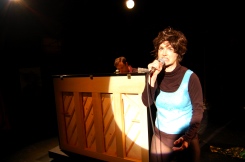
photo: Ariana Smart Truman, Thumbnail photo: Ariana Smart Truman
Sybil: Yeah, she existed in my imagination and I put her in this play ‘cause I needed something and I thought, wow, those songs kind of speak to something in the play. That’s how it started. Then in 2007, we did it again at Dixon Place on a commission when we had a longer run.
Mike: And a slightly different cast.
Sybil: Slightly different cast, but a lot of the same, and that was also great. On that production, I had an intern named Suzanne Davies, who’s from Wales.
Mike: As in the United Kingdom.
Lucy: Thank you. Mike is here for the geographic references, to keep them straight.
Mike: Back-checking.
Sybil: And she dared me, or suggested, but I took it as a dare, to do a one-woman version of that play. I don’t remember what the circumstances were. Maybe I was giving someone a line reading or something, and she said you should do a one-woman version of this play. So, I kept on thinking about it and I thought, why the hell not? Why couldn’t I? And I remembered that Scott Sheppard had done The Scotts Play? Do you know what I’m talking about, by Shakespeare?
Lucy: I do, wink-wink, wink-wink because we’re in the theater.
Sybil: We’re in a theater and we don’t want to go through all the rigmarole.
Mike: I broke that last year…
Sybil: But he used to do a one man’s Scott play. And also, he did Hamlet that way when we first started working on Hamlet, and I saw him do it and it was amazing. All he did was change the focus of where he was looking. He’s a very precise performer and you can absolutely pick out all the different characters. So I thought, well, this isn’t Shakespeare—I could do it. And I wrote it, so it’s easy, I know all the characters and I have all of these performances to draw on. So I decided to do it, but then I realize I couldn’t play the piano…
Lucy: So you were forced to ask Mike Iveson to join you.
Mike: That’s how must people work with me.
Lucy: They have no choice.
Mike: They’re backed into a corner. They break down and then they call me in.
Lucy: So you come in Mike and you sit at the piano? Or do you sit over Chinese food and start talking?
Mike: To be honest, Sybil never said I’m doing a one-woman version of the show and I want you to play the piano. She said let’s do a two-person version of the show. And we didn’t know what that meant. I didn’t know… Did you know what it was going to be?
Sybil: Uh-uh.
Lucy: Literally, I’m asking, so you are in the rehearsal process, you don’t know what it’s going to be, and are you sitting there talking and watching T.V., are you drinking coffee and making each other laugh or are you up singing songs?
Sybil: At first Mike was just doing the stage directions, but then it grew and he started playing the music underneath that. There was one day where that just kind of happened and then we thought, oh, well, that’s it. He’s playing underneath.
Mike: I was being a little lazy about really learning the songs. I would sort of listen to them and then we would have this sheet music that was… that was nice because we would wind up making these weird… Sybil went along with every stupid misapprehension I had about how the song actually goes. Do you know what I mean?
Lucy: I do.
Mike: Like I would look at the text of it and she really was like, okay, yeah… I would be like it kind of goes like this, and whatever I would say, she would go yeah, that’s how it goes.
Lucy: As filtered through…
Sybil: But you made the arrangements and orchestration and made it differently and made it more ornate than the original…
Mike: Sometimes. Sometimes it’s much more simple.
Sybil: Yeah, that’s true too.
Lucy: But it’s filtered through the two of you in rehearsal and coming up with what you… you had an instinct of what the songs should be or would be.
Mike: Yeah.
Lucy: One other question to flip it now to the present and beyond. You were doing the show, basically another version of that show—the two-person show—but you have a late-night show where you flip roles. Is that correct?
Mike: That’s correct.
Lucy: Talk to me about that.
Mike: When we started working on it, Sybil didn’t know how to play the piano. Now she does.
Sybil: I’m learning.
Lucy: Good for you.
Mike: She’s teaching herself how to play the piano. She is playing what I’m playing.
Lucy: Now, you talked about it being a lot about the Bruce Springsteen filtered through the female voice and persona. How does it work when it flips back? My guess is that Mike is filtering your performance of that stuff…
Mike: That’s what I’m trying to do.
Lucy: But are you reinserting your penis, sort of speak?
Sybil: Oh, that’s a good idea.
Mike: Reinserting the cock, the cock, which had fallen out.
Sybil: Just say penis.
Mike: You don’t like cock?
Lucy: Penis is nicer.
Mike: It is? It’s so biological. I don’t like that. Well, actually most of the characters—that’s not true—a lot of the characters are women in the show.
Lucy: And do you keep them women?
Mike: I’m trying to, yeah.
Lucy: So, you’re trying to do exactly what Sybil does, only filtered through you.
Mike: Exactly, more or less.
Lucy: You use the same language but you’re still being yourself.
Mike: Yeah, but I bring the male perspective.
Lucy: That’s what I’m saying, you put the penis back in. That was my question.
[Laughs]
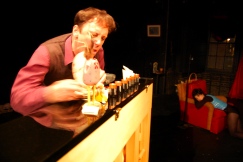
photo: Ariana Smart Truman
Mike: I hope that I’m doing the Bruce songs like a man playing a woman playing a man. But I don’t know yet. We haven’t done it yet.
Sybil: First time we do it will be Saturday.
Lucy: Very exciting.
Sybil: Terrifying. But we did do it for a friend of ours, Anna Foss Wilson, who had not seen the regular version, and she said afterwards that she couldn’t imagine what it would be like in the regular [arrangement]. So we said, okay, we’re fine; it’s a show. Because it didn’t look to her that we were trying to do what the other person… She accepted it as its own reality. So, who cares? Beyond that, I can’t… I mean I’m really working hard on the piano. I’ve been here today and yesterday, working, learning.
Mike: She’s really doing it; she’s not faking it.
Sybil: Mike is a stern taskmaster.
Lucy: No surprise there. A question to you: I’ve heard about Mike—what he’s doing—but the difference for you in performing your regular version of it that you’ll being developing, with you doing the singing and Mike playing. And you’re still being a variety of the characters. Then when you go to the piano, are you somehow more being more Sybil than you are when…
Sybil: I think so. I get a lot quieter, a lot more humble because I really don’t know what I’m doing. I’m not like… do you know what I mean though Mike?
Lucy: You don’t have time to put on a character on top of it.
Sybil: It’s humility because I don’t know what I’m doing. I didn’t write those songs. I don’t know anything about what I’m doing. It’s entirely… I don’t have time to do… I can’t do like a character, like Mike does.
Mike: It’s also the problem of doing the thing too (because) there’s so much piano playing, there’s a lot of chord changes—we tracked them throughout the whole show—that you can’t concentrate on much else. I can’t when I’m doing it.
Sybil: Yeah. But you are playing a character at the same time. You’re not just being Mike. Am I right?
Lucy: In my perception, yes, but in your perception you’re being Mikee.
Sybil: Mikeish.
Mike: I… I don’t… yeah, yeah. Yeah. No. No, I was just actually going to the point that there’s a lot of time when you have to let go of the idea of character completely because you have to focus on the notes. That’s the weird and sort of beautiful and problematic part of having the musician experience. I let some of Sybil’s lines in and let some of Sybil’s lines out when I’m on the piano. I just don’t even think about it. I have to think about, you know, what I’m doing a little bit ‘cause it’s a little different every night.
Lucy: How is it different?
Mike: It’s just a little different. It’s not radically different but, you know, I have to, my cues will come in the music, but if I’m like a little late, because I’m in the middle of something, you know what I mean, like if I’m in the middle of a chord change or some stupid little thing I’m experimenting with, you know, some stupid thrills, whatever, then I’m going to be a little late for the cue. Sometimes I feel that I’m pushing it a little early.
Lucy: Who’s driving the show?
Sybil: That’s such a good question.
Mike: I really think Sybil’s driving the show. Except I know that there are times…
Sybil: I think Mike is driving the show.
Mike: We haven’t talked about it. But we have a couple of times in the show where she has a cue to wait for me. But I have noticed lately that there are other cues that we didn’t talk about that you’re waiting for me. Maybe now is the wrong time to talk about it because it’s going to be on record.
Sybil: Well, it’s definitely a push and pull, let’s put it that way, at all times.
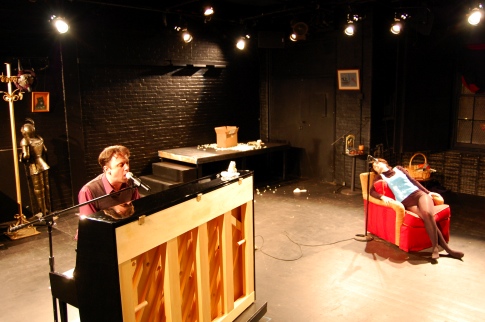
photo: Ariana Smart Truman
Mike: I think that’s sort of the subject of the show. Not to be super pretentious about it.
Lucy: This is my next question. If you had to say in just one or two sentences what the show is about, what do you think the show is about?
Mike: Well…
Lucy: Or, is that not a fair question?
Mike: No, I think it’s a fair question. There’s the text and there’s the performance. They are not at odds. They speak to each other, but they are a little bit two different… I think what the show is, maybe—let’s just dive into over-thinking pretentious—probably what the show is this dialogue or this battle between Mike and Sybil, and then this very beautiful, delicate, funny text that she wrote. The literal reality of the performers and our relationship is such one of the main subjects of the show. And it is also embedded in the script, in a way. You know what I mean? In the way that Mike and Sybil are characters in the play. I think the experience of watching it—this is way more than two sentences—starts off, or at some point you get the idea that we’re doing a play, but then the onstage reality of two people, I think takes over.
Lucy: And aside from the reality between the two of you, what would you say the piece is about or what is driving you or drove you to begin with it?
Sybil: Okay, I would talk then about the dramatic text because I think everything that I’ve done to work on the performance text has come from somewhere, either my relationship with Mike or from inside the dramatic text, which for me is, I always say, about violence—how easy violence is. How easily it can happen and how it can spread between people. It’s something that is very simple, but also very confusing when it happens and it starts to spread.
Lucy: For me, so much of what I was moved by in the piece was this emotion that you are connecting in those Bruce Springsteen songs and transforming them. So many times you would start a song and I would think, that’s an interesting song she’s written, and then I was like oh, no, that’s this Springsteen song, and it would come around that way, which was this great way of feeling about the song, and a way in which you let me connect with you before I connected my own memories of East Street shuffle. How is your emotional relationship with the Bruce Springsteen songs connect with what you’re talking about violence?
Sybil: A lot of these songs are about unfairness and what unfairness is and how it takes its toll over periods of time. And a lot of the play is about that too. How unfair it is if someone has a medical condition—that’s the first scene in the play. And that’s where this sense of violence springs from that sets off this insane chain of events that sort of pushes the regular structure of the play sort of almost to where you don’t even know where you are. It almost blows the whole thing apart eventually. So putting those songs was sort of a random idea, at least consciously. It was just juxtaposition. I just put them together and then they started speaking, you know, that’s what happens. I think at the core of it is the emotional idea of unfairness and what that really means and how it ends up feeling. I mean, everyone has unfairness in their situation.
Lucy: How does your discussion of female and male fit into your discussion of unfairness and violence? Do you think this is unfairness and violence in the world in general and you just happen to be a woman so you’re incorporating all these characters? Or is there something in particular of the female relationship to violence?
Sybil: I think probably yeah.
Lucy: You didn’t start out thinking that way, but it comes, again, you can’t help it being there.
Mike: It is fair to say also that the two long monologues are delivered by women, which I think anchors it in that feeling a little bit.
Sybil: But then the cowboys at the end…
Mike: Right, then there are two at the end that are men.
Sybil: …but they’re not real people; they’re ideas of man, simulacra of men.
Mike: It’s funny to say, but the cowboy monologues are, and this is a crazy thing to say, but I’m more conscious of the female voice there than almost anywhere else in the play.
Lucy: More conscious that it’s a woman saying the cowboy’s line.
Mike: Yeah, for some strange reason…
Sybil: Yeah, that’s on purpose.
Mike: I mean, I think it’s deliberate. It feels deliberate when it’s happening.
Lucy: Well, cowboys are kind of cartoons.
Mike: Exactly. And you can pull whatever you want to on them, in a way. And I guess when you’re dealing with a cowboy you’re sort of having a dialogue with a male archetype anyway.
Lucy: Okay, last thing I want to say. This is the last question and last subject for you to wrap up. In addition to watching, as you say, the push and pull of the two of you, you know, I’m also watching a loving relationship. I mean, the two of you are very…
[Laughs]
Mike: Look at Lucy’s face!
Lucy: Do I want to say in love? But it has that quality. Maybe that’s just the quality of a good partnership, a good duet… (To the recorder: There’s a lot of anger coming from the interviewees.)
Mike: What is the question?
Lucy: Do you love working with each other?
Mike: Yes.
Sybil: Yeah, I love working with Mike.
Mike: She thinks I don’t love working with her right now.
Sybil: No. I know that you do.
Lucy: And this is not the only thing you’ve worked on together.
Mike: No.
Lucy: How many pieces have you been in together?
Mike and Sybil: Two and a half.
Lucy: And then this one has had many incarnations in the last three years.
Sybil: And then we did Potatoes of August. Last year we sat down and we wrote some songs from scratch—we didn’t use anybody else’s songs. And then we’ve been working on another piece that I think someday will end up seeing the light of day, but we have a lot more work to do on it.
Lucy: Can you tell us what the subject of that piece is, what your jumping off point is?
Mike: Well, we’re a little interested in the music of Johannes Brahms.
Lucy: Who isn’t? Good point.
Mike: We’re starting with Brahms. And how you feel when you’re shopping and then you go home. And you still feel the same way when you’re walking around your room as you did when you’re shopping.
Sybil: Or anytime you’re confronted with any commercial images in a closed system.
Lucy: And then you put on Brahms.
Mike: Well, does Brahms help you work your way through that?
Sybil: You might sing some Brahms…
Mike: There’s also another play I hope Sybil is working on wherein we use the music of The Smiths to discuss World War I.
Lucy: Good. So, always music, always talking, always the two of you in the room making the thing.
Sybil: Although this other piece we’re talking about with the Brahms has no talking as yet, which I think is very refreshing.
Mike: But it may be a little sad because Sybil…
Lucy: She’s a good talker.
Mike: She’s a wordsmith.
Sybil: But sometimes is good to take a little rest.
Lucy: And that’s what we’re going to do now. We’re taking a little break. Thank you very much.
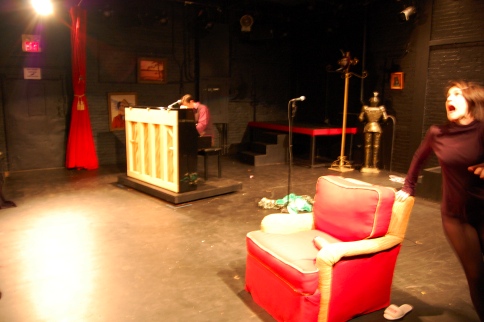
photo: Ariana Smart Truman
